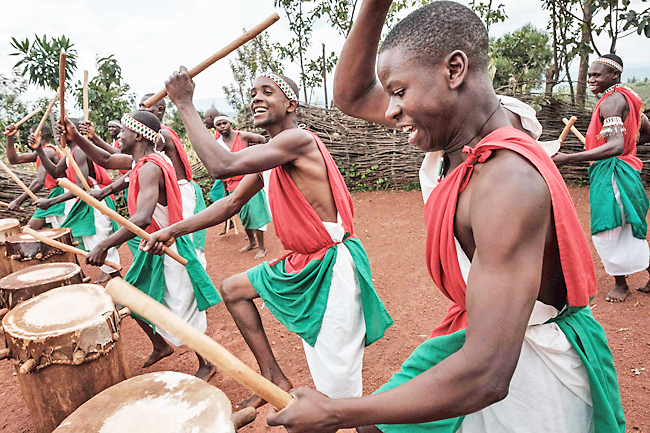GISHORA, BURUNDI (AFP) – A troupe of barefoot musicians wearing the national colours of Burundi strike huge wooden royal drums with tremendous force, precision and joy.
Twirling and singing, a stick in each hand, the performers are the custodians of a centuries-old ritual recognised by the United Nations Educational, Scientific and Cultural Organization (UNESCO), and one jealously guarded by the Burundian state. Too jealously guarded, according to some.
“We beat the drum because it’s our life, because it’s in our blood,” said their leader Oscar Nshimirimana, his face dripping with sweat after a spirited performance in Gishora against a backdrop of rolling green hills.
Troupes hailing from Gishora – home of a royal palace and the heartland of this musical tradition – enjoy a lofty and celebrated status. Burundi’s President Evariste Ndayishimiye graced one of their performances in January, causing a stir.
In the tiny landlocked nation of 12 million people, drumming troupes big and small perform at weddings, religious ceremonies and other celebrations – as well as competing against each other.
Across the globe, too, drummers in the Burundian diaspora are found on at least three continents. “The ritual dance with the royal drum” is the jewel in the country’s intangible heritage, declares a Culture Ministry document. “The prodigious leaps, the pirouettes, the winks to the spectators… all this has always marked this dance, as the bearer of an uncommon tradition, in the whole of African and world percussion.”

The drumming tradition known locally as ingoma dates back to the 17th Century, and honoured the eternal rule of the royal family at a time when Burundi was a monarchy. Upon assuming the throne, a king was said to have “ascended the drum”, which was considered the source of his power.
The most hallowed drums are even given names. Many have vanished through the ages but two, known as Ruciteme and Murimirwa, are enshrined in a traditional straw hut in Gishora.
For a long time, these drums could only be carved from the gigantic trunks of umuvugaangoma, or “the tree that makes the drum talk”.
In 2014, UNESCO recognised the cultural value of the tradition, inscribing the ritual dance of the royal drum on its list of intangible world heritage.
Since then, the Burundian government has enforced strict rules around the practice.
In 2017, a long-forgotten edict banning women from playing the drums was re-imposed, while dress codes for performers were mandated. Troupes have since been required to register with the authorities, while those wishing to hire drummers for a private event need to apply for special permits costing USD250.
In Burundi, which is the poorest country in the world in terms of GDP per capita, this is no small imposition.
Adviser to the Culture Minister Aimable Nkunzumwami said the government had a duty to ensure “respect for the cultural identity” of the drum, especially since the UNESCO listing. “It is the government that (must) protect the Burundian drum. That is why it has regulated the practice,” he told AFP.
In the economic capital Bujumbura, 27-year-old engineer Calixte Irantije practises twice a week after work with his drumming troupe. “These rules have caused a reduction in demand it has had a big impact on the market we used to have,” he said.





